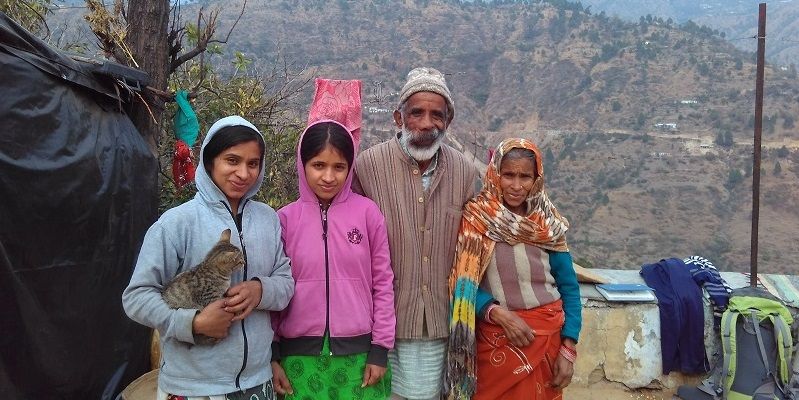Meet this man in remote Uttarakhand who has dedicated his life to preserving seeds
India had more than 10,000 naturally growing varieties of rice at one point in time. And this isn’t only with rice; different regions with their different climatic conditions automatically led nature to provide us with different seeds. Our desire for standardisation and urge to make a better world led us to experiment with seeds and produce hybrid seeds. This is probably why so many of us eat only white polished rice.
At our farm in Himachal Pradesh, we were looking to plant some indigenous varieties but were surprised that all fingers pointed us to the agricultural shops that sell seeds. Traditionally, most of the villages in India depended on exchanging seeds and it led to a beautiful, self-sustaining seed bank. For instance, if my farm gave good tomatoes this year and your land gave good cabbages, we’ll exchange the seeds next year. Everyone in the village has a good access to high quality seeds this way and the quality of seeds automatically goes up every year.
Our hunt for people working with this ethos led us to the doorstep of Vijay Jardhari of Beej Bachao Andolan in remote rural Uttarakhand. In a village called Upli Nagli near Tehri district in Uttarakhand, we reach Vijay Jardhari’s house after a full day’s bus ride and a two-hour hike up the hill. Perched atop a beautiful hill, the house provides for a very modest life for Vijayji and his family, which is dedicated to the cause of preserving seeds.



One of the key figures during the epic Chipko movement (primarily a forest conservation movement started in 1973) Vijayji has dedicated his life to preserving seeds. His farm is a prime example of abundance of nature and his treasure of seeds leaves one in awe. He showed us some 20 varieties of rajma (kidney beans) and holding them in the hands feels like holding valuable gem stones. “What scientists are selling to us today has always been provided for by nature,” says Vijayji. Through Beej Bachao Andolan, he and his colleagues spread the knowledge of traditional farming practices and more people moving to these methods is their only motivation.

To talk in terms of numbers, Tulip Das presents a case for Beej Bachao Andolan on her blog:
In this region of Uttarakhand, farmers were growing a distinctive variety of red rice called chardhan. The rice was nutritious and suited to local requirements and conditions. Farmers also grew indigenous varieties like thapchini, jhumkiya, rikhwa and lal basmati. Agriculture here was untouched by modern practices and good yields were obtained without the use of chemical fertilizers and pesticides. What the farmers here were doing was avoiding monoculture in a method called baranaja (12 grains), which involves the multicropping of a number of cereals and legumes. This diversification is security against drought and crop failure. Different crops are harvested at different times of the year and ensure year-round supply of food. This also maintains soil fertility by replenishing nitrogen.
Now, Beej Bachao Andolan has about 150 varieties of paddy from which 100 different varieties can still be grown. BBA has also collected more than 200 varieties of rajma. Effective pest control is accomplished by using the leaves of the walnut and neem, and the application of the ash and cow’s urine. The use of traditional farming methods and seeds has resulted higher yields, improved health of humans and increased conservation of soil fertility and agro-biodiversity.


This story is not a celebration of Beej Bachao Andolan or any individual, because recognition will not bring about any change. “My only wish to talk is so that more people can live this way of life. We are causing immense damage to the earth and more people in the cities need to wake up to these realities since the massive changes percolate from city to the village,” Vijayji explains. In the case of farming methods and seeds, the movement calls for more decentralised systems that can fend for themselves.
Globally, the likes of Monsanto control the seeds market and more companies are growing with this intention. Baer, the pharmaceutical giant bought out Monsanto for $56 billion and we are moving rapidly towards an unnerving monopoly. There is no good or bad judgement over this but as humans, is this what we are on earth for? A war against nature? Our ‘Slow Tech’ movement is an initiative to put focus on these discussions and do things that feel right in our own small ways.
Vijay Jardhari’s Beej Bachao Andolan has reach in the Gharwal regions of Uttarakhand and there are many more efforts happening across India. Navdanya in Dehradun (started by Vandana Shiva), Auroville in Pondicherry has many farms working on these philosophies (Solitude farm), many holistic learning centres like CFL and Mudra Farms in South India and the likes of Sikkim on a State level are thinking along these lines. The idea for this article is to put more momentum in this direction and bring voices like Vijay Jardhari to mainstream.
Write to us at [email protected] if you have ideas to collaborate or need access to Vijay Jardhari’s work and books. Download the concept edition of Slow Tech magazine here.











